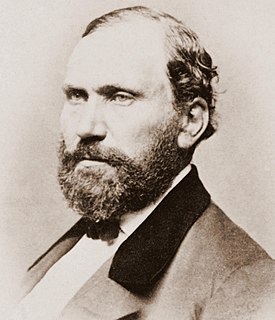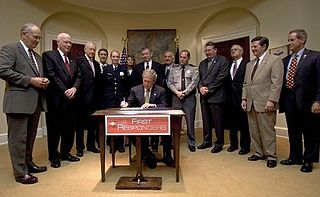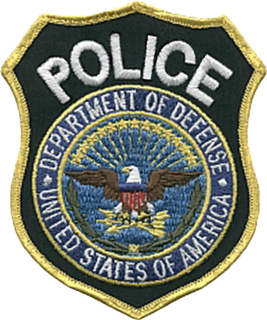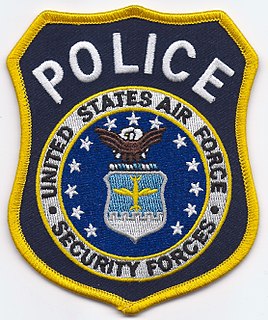
A detective is an investigator, usually a member of a law enforcement agency. They often collect information to solve crimes by talking to witnesses and informants, collecting physical evidence, or searching records in databases. This leads them to arrest criminals and enable them to be convicted in court. A detective may work for the police or privately.

A police officer is a warranted law employee of a police force. In most countries, "police officer" is a generic term not specifying a particular rank. In some, the use of the rank "officer" is legally reserved for military personnel.

The Bureau of Alcohol, Tobacco, Firearms and Explosives (BAFTE), also referred to as the ATF, is a domestic law enforcement agency within the United States Department of Justice. Its responsibilities include the investigation and prevention of federal offenses involving the unlawful use, manufacture, and possession of firearms and explosives; acts of arson and bombings; and illegal trafficking and tax evasion of alcohol and tobacco products. The ATF also regulates via licensing the sale, possession, and transportation of firearms, ammunition, and explosives in interstate commerce. Many of the ATF's activities are carried out in conjunction with task forces made up of state and local law enforcement officers, such as Project Safe Neighborhoods. The ATF operates a unique fire research laboratory in Beltsville, Maryland, where full-scale mock-ups of criminal arson can be reconstructed. The agency is led by Marvin Richardson, Acting Director. Richardson previously served as the Associate Deputy Director and Chief Operating Officer, the second highest ranking official at ATF, from October 2019 to June 2021. The ATF has 5,101 employees and an annual budget of $1.274 billion (2019).
A state bureau of investigation (SBI) is a state-level detective agency in the United States. They are plainclothes agencies which usually investigate both criminal and civil cases involving the state and/or multiple jurisdictions. They also typically provide technical support to local agencies in the form of laboratory and/or record services, or to directly assist in the investigation of cases at the local agency's request.
Special police usually describes a police force or unit within a police force whose duties and responsibilities are significantly different from other forces in the same country or from other police in the same force, although there is no consistent international definition. A special constable, in most cases, is not a member of a special police force (SPF); in countries in the Commonwealth of Nations and often elsewhere, a special constable is a voluntary or part-time member of a national or local police force or a person involved in law enforcement who is not a police officer but has some of the powers of a police officer.

The Alaska State Troopers, officially the Division of Alaska State Troopers (AST), is the state police agency of the U.S. state of Alaska. It is a division of the Alaska Department of Public Safety (DPS). The Alaska State Troopers is a full-service law enforcement agency which handles both traffic and criminal law enforcement. The Alaska State Troopers is also involved in apprehending fugitives as part of the Alaska Fugitive Task Force, an inter-agency collaborative of Alaska police departments that cooperates with police agencies throughout the United States and less commonly with Interpol in apprehending wanted men and women. Unlike many lower-48 states, Alaska troopers are both state troopers and game/wildlife enforcement officers.

The New Jersey State Police (NJSP) is the official state police force of the U.S. state of New Jersey. It is a general-powers police agency with statewide jurisdiction, designated by troop sectors.

Law enforcement in Germany is constitutionally vested solely with the states, which is one of the main features of the German political system.

The Port Authority of New York and New Jersey Police Department, or Port Authority Police Department (PAPD), is a law enforcement agency in New York and New Jersey, the duties of which are to protect and to enforce state and city laws at all the facilities, owned or operated by the Port Authority of New York and New Jersey (PANYNJ), the bi-state agency running airports, seaports, and many bridges and tunnels within the Port of New York and New Jersey. Additionally, the PAPD is responsible for other PANYNJ properties including three bus terminals, the World Trade Center in Lower Manhattan, and the PATH train system. The PAPD is the largest transit-related police force in the United States.
Law enforcement in the United States is one of three major components of the criminal justice system of the United States, along with courts and corrections. Although each component operates semi-independently, the three collectively form a chain leading from an investigation of suspected criminal activity to the administration of criminal punishment.

The Oklahoma State Bureau of Investigation (OSBI) is an independent state law enforcement agency of the government of Oklahoma. The OSBI assists the county sheriff offices and city police departments of the state, and is the primary investigative agency of the state government. OSBI works independent of the Oklahoma Department of Public Safety to investigate criminal law violations within the state at the request of statutory authorized requesters. The OSBI was created in 1925 during the term of Governor Martin E. Trapp.

The Maine State Police (MSP) is the state police agency for Maine, which has jurisdiction across the state. It was created in 1921 to protect the lives, property, and constitutional rights of the citizens of the state of Maine.

The Law Enforcement Officers Safety Act (LEOSA) is a United States federal law, enacted in 2004, that allows two classes of persons—the "qualified law enforcement officer" and the "qualified retired or separated law enforcement officer"—to carry a concealed firearm in any jurisdiction in the United States, regardless of state or local laws, with certain exceptions.

In many countries, particularly those with a federal system of government, there may be several law enforcement agencies, police or police-like organizations, each serving different levels of government and enforcing different subsets of the applicable law.

United States Department of Defense Police are the uniformed civilian police officers of the United States Department of Defense, various branches of the United States Armed Forces, or specific DoD activities.
The California Department of Justice is a statewide investigative law enforcement agency and legal department of the California executive branch under the elected leadership of the California Attorney General (AG) which carries out complex criminal and civil investigations, prosecutions, and other legal services throughout the US state of California. The Department is equivalent to the State Bureau of Investigation in other states.
Law enforcement in New York City is carried out by numerous Federal, State, City and Private agencies. New York City has the highest concentration of Law Enforcement in the United States.

The New Jersey Society for the Prevention of Cruelty to Animals is a law enforcement agency in the state of New Jersey that focuses on humane law enforcement. The agency enforces animal-related laws and investigates cases of animal cruelty. In January 2018, Governor Chris Christie signed a bill intended to dissolve the organization and transfer animal cruelty law enforcement to county prosecutors, municipalities, and county SPCA agencies. The NJSPCA will cease law enforcement operations by August 1, 2018. The agency was disbanded in 2018 after a State Commission of Investigation Reports (SCI) showed that the agency could not account for over 700K in Attorney fees, mismanaged bank accounts, and businesses created by its Board Members. The agency was virtually bankrupt at the time it was disbanded due to a lack of oversight. The NJSPCA was sued in 2015 under the Open Public Record Act in which it spent 140K on Attorney's fee's. It was order on 4 separate occasions that they were a Government Agency and subject to OPRA. See Sci Report https://www.nj.gov/sci/pdf/SPCA-FollowUpReport.pdf

The Bureau of Indian Affairs Police, Office of Justice Services, also known as BIA Police, is the law enforcement arm of the United States Bureau of Indian Affairs. The BIA's official mission is to "uphold the constitutional sovereignty of the Federally recognized Tribes and preserve peace within Indian country". It provides police, investigative, corrections, technical assistance, and court services across the over 567 registered Indian tribes and reservations, especially those lacking their own police force; additionally, it oversees tribal police organizations. BIA services are provided through the Office of Justice Services Division of Law Enforcement.

The United States Department of the Air Force Police are the civilian uniformed police service of the United States Department of the Air Force, responsible for the force protection of assets and all aspects of law enforcement on U.S. Air Force and U.S. Space Force installations, and other facilities operated by Air Force and Space Force.















